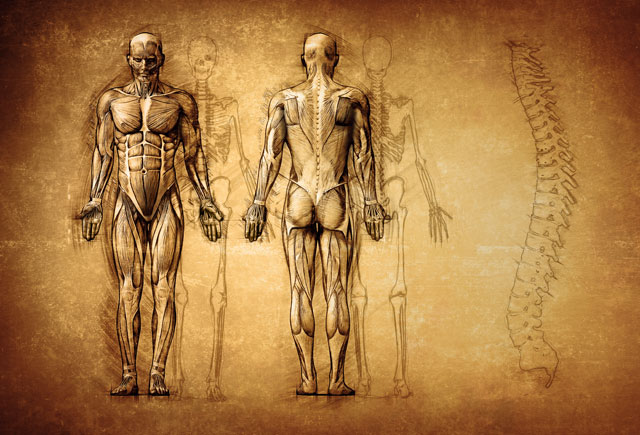Section 1: Introduction
We will review foods and supplements that contain these important nutrients. When people include these nutrients in their diet, they are providing their body with vital nutrition and optimum health.
We will learn about healthy foods that contain calcium, vitamins, and minerals. We will also learn how to make healthy food and vitamin supplement choices.
You are well on your way to making positive food choices and eating nutritious food so that you can be at your best. Give yourself some credit for your efforts and the path you've taken. Good for you!
Section 2: Calcium
1. Benefits of Calcium
Calcium is the most abundant mineral in the body. Most of the calcium in your body is found in your teeth and bones, where it makes up your bone structure.
Your bones are constantly remaking themselves by releasing and absorbing calcium. Calcium is also taken from bones and transported to other parts of the body, as needed.
Calcium is also needed in the contraction of muscles, the contraction and expansion of blood vessels, and the production of hormones and enzymes. You need calcium for your nervous system to function properly, and calcium is said to lower blood pressure.
2. Servings of Calcium
Most adult men and women need 1000 mg of calcium each day. Kids ages 9 to 18 need about 1,300 mg each day. Younger children, ages 4 to 8, need about 800 mg a day, and children ages 2 to 4, need about 500 mg a day. Postmenopausal women are thought to need a little more: 1200 mg daily. Men over the age of 50 also need about 1200 mg each day. The USDA recommends that anyone over the age of 2 should eat two to three servings of calcium each day.
A serving of calcium could be:
*1 cup or 8 oz. of milk
*8 oz. of yogurt
*1.5 oz. of cheddar cheese
*6 oz. calcium-fortified orange juice
*1/2 cup cooked spinach
*3 oz. sardines with bones
*1 ½ cups kale
*1 cup calcium-fortified cereal
*2 tablespoons peanut butter
3. Foods that Provide Calcium
Milk and milk products, like cheddar cheese, and yogurt, are high in calcium. You can also meet your calcium needs from other foods with calcium, such as sardines or salmon with bones, calcium-fortified soy milk, tofu, dark green vegetables, and beans. Some other foods may have calcium because it has been added, such as calcium-fortified orange juice.
4. Osteoporosis and Bone Health
Your bones are like the calcium storage house of your body. If you don't eat enough calcium, your body will take too much calcium from your bones and use the calcium for other important activities in your body.
Osteoporosis occurs when your body doesn't receive enough calcium, making you prone to bone fractures. Be sure to get enough calcium in your diet, so this doesn't happen to you. You also need some vitamin D to help absorb calcium, but not too much vitamin D.
You can also prevent osteoporosis from other lifestyle habits, in addition to getting a sufficient amount of calcium. Not smoking, not drinking too much alcohol, not being too skinny, and getting enough weight-bearing exercise can help keep bones healthy. Weight-bearing exercise could include walking, running, dancing, or aerobics. (Water aerobics is non-weight bearing).
Section 3: Vitamins and Minerals
1. What are Vitamins and Minerals?
You need vitamins and minerals to carry out different functions in your body, such as supporting the immune system, making cells, and helping organs do their jobs. For example, the Vitamin A in carrots is beneficial to vision.
Vitamins are organic substances, which means they come from plants. Minerals are inorganic substances that come from water or soil. Your body needs to consume certain vitamins and minerals every day, since your it doesn't make them. Some, like calcium, are needed in large quantities. Others, like zinc and iron, are very important, but you only need trace amounts. It's important not to take too much of the trace minerals, because that can be very dangerous.
2. Fat and Water Soluble Vitamins
Some vitamins need fat to be dissolved and these are called fat-soluble vitamins. The fat-soluble vitamins are vitamins A, D, E, and K. Fat-soluble vitamins can be stored in the body. They are actually stored in your body's fat, so fat is needed to store them. It's important to get enough vitamins A, D, E, and K, but not too much, since they can be toxic.
Other vitamins are water-soluble, and these dissolve in water. The water-soluble vitamins are the B-complex vitamins (vitamins B6, B12, niacin, folate, and riboflavin), and vitamin C. The water-soluble vitamins cannot be stored in the body and any that are not used are excreted in urine. That means it's important to consume enough water-soluble vitamins on a daily basis.
3. Foods With Important Vitamins and Minerals
a. The water-soluble vitamins need to be replenished every day. Here are some foods rich in these vitamins:
Vitamin B1 (Thiamine): pork, beef, lamb, liver, peas, seeds, legumes, whole grain products, and oatmeal.
Vitamin B2 (Riboflavin): milk, yogurt, cheese, whole grain breads and cereals, green leafy vegetables, meat, eggs, and beef liver.
Vitamin B3 (Niacin): meat, poultry, liver, eggs, nuts, brown rice, fish, peanut butter, milk, and whole grains.
Vitamin B6 (Pyridoxine): lean meats, fish, legumes, green leafy vegetables, raisins, whole grain cereals, bananas, lentils, mangos, and poultry.
Vitamin B12 (Cobalamin): meat, fish, poultry, eggs, milk products, and clams.
Folic Acid (also called Folacin or Folate): enriched cereals, or breads with folic acid, spinach, liver, peas, oranges, Brussels sprouts, and avocados.
Pantothenic Acid and Biotin: a variety of plant and animal foods.
Vitamin C (Ascorbic Acid): many fruits and vegetables, such as melons, berries, tomatoes, broccoli, fortified juices, mangos, kiwi, papaya, yellow peppers, and citrus fruits.
b. The fat-soluble vitamins can be found in the following foods:
Vitamin A (Retinol): liver, eggs, milk, butter, margarine, and cheese. Beta-carotene can be found in cantaloupes, carrots, sweet potatoes, winter squash, spinach, and broccoli.
Vitamin D: fortified milk, margarine, egg yolks, tuna, salmon, canned sardines, cod-liver oil, shrimp, and mackerel.
Vitamin E (Tocopherols): vegetable oils, margarine, salad dressings, whole grain cereals, green leafy vegetables, nuts and seeds, peanut butter, and wheat germ.
Vitamin K: turnip greens, cauliflower, spinach, beef liver, broccoli, kale, and cabbage.
The best way to attain the vitamins and minerals you need is to eat a balanced diet, with a variety of nutritious foods. Sometimes it's hard to get all the nutrients we want, even for people who are very good about eating nutritious foods. Some people might need certain extra vitamins if they smoke, have a health condition, drink coffee, or are under stress.
Some experts say it's better to try to get all your nutrients from foods. Even overeating certain foods can cause toxicity in your body. For instance, if you eat way too many carrots, your complexion can turn orange. On the other hand, some experts think there are some health benefits in taking vitamin supplements that are difficult to achieve through eating.
Consult with your doctor about what's best for you. If you do choose to take vitamin supplements, check with your doctor to make sure your vitamins or/and calcium supplements do not interfere with any medications you are taking. After you buy your vitamins, take them with you to your doctor's office so he or she can see what you are thinking of taking.
Remember – vitamins cannot make up for a poor diet. Even if you do take vitamins, be sure to eat as nutritious a diet as you can.
It's better to take a multivitamin or B-complex vitamin than a separate vitamin for each nutrient. Vitamins tend to work together in the body, so they need each other. Also, if you take a calcium supplement, be sure it has Vitamin D in it, since Vitamin D is needed to absorb calcium.
Choose vitamins that are 100 percent of the dietary reference intakes (DRIs) recommended daily allowances (RDAs) for vitamins and minerals. Avoid taking more than 100 percent of the DRI/RDA, unless you discuss this with your doctor first. This is especially true of the fat-soluble vitamins A, D, E and K, since they can be toxic if you take too many of them.
IMPORTANT: Be very careful about iron supplements. Do not take iron supplements without discussing this with your doctor. Iron pills only need to be taken temporarily, since they will build up in your body. Keep all iron supplements out of reach of children and pets, since iron can be very toxic.
Exercise:
Decide how you will incorporate some calcium in your diet. You can look at your food diary, if it helps. Also, decide if you need a multivitamin. Check this out with your doctor, if you need help.






























